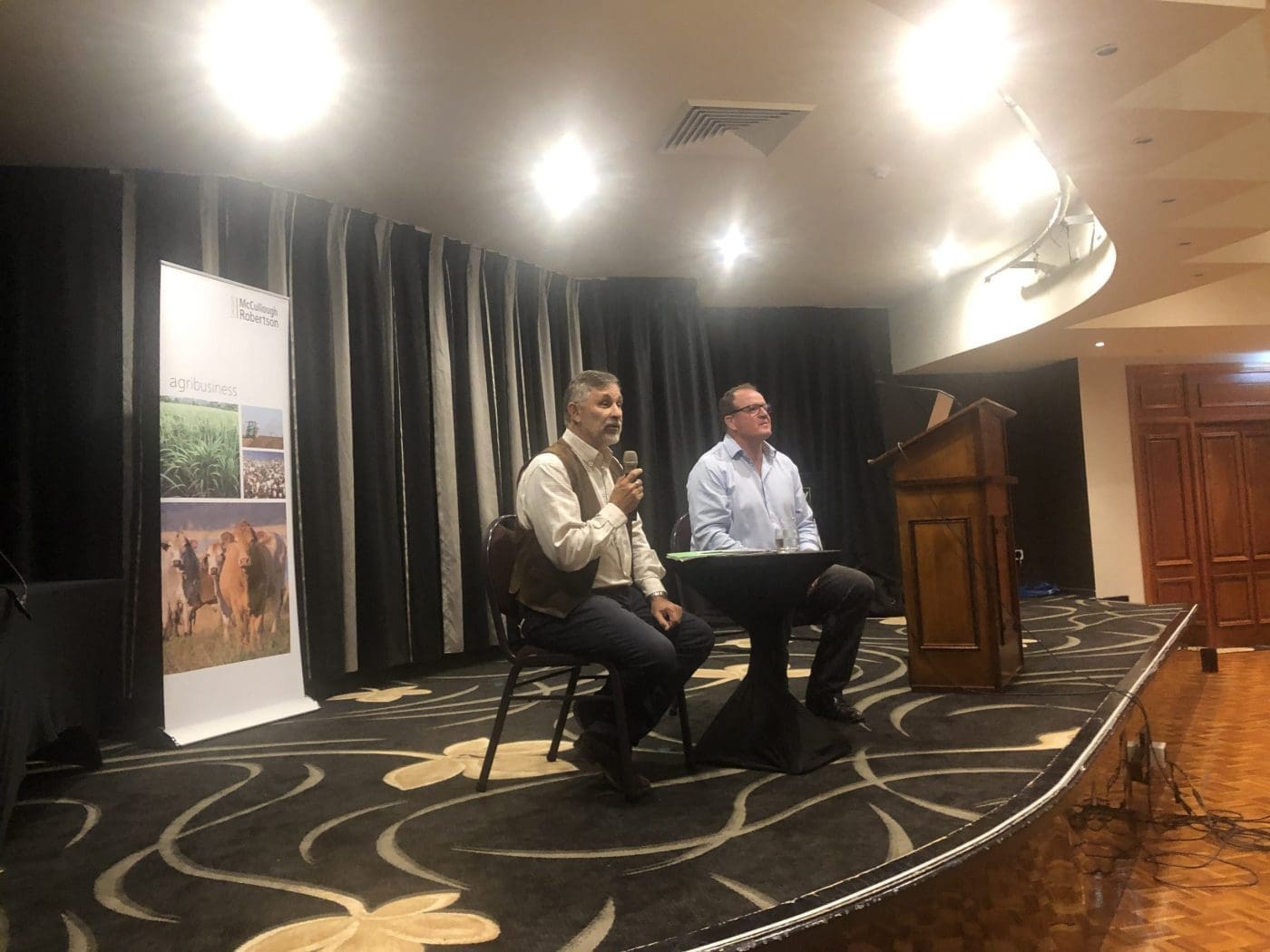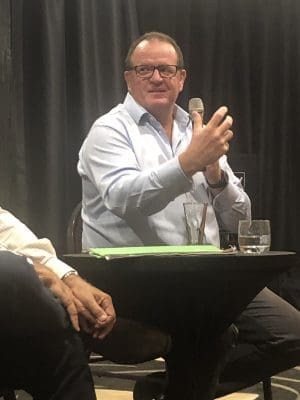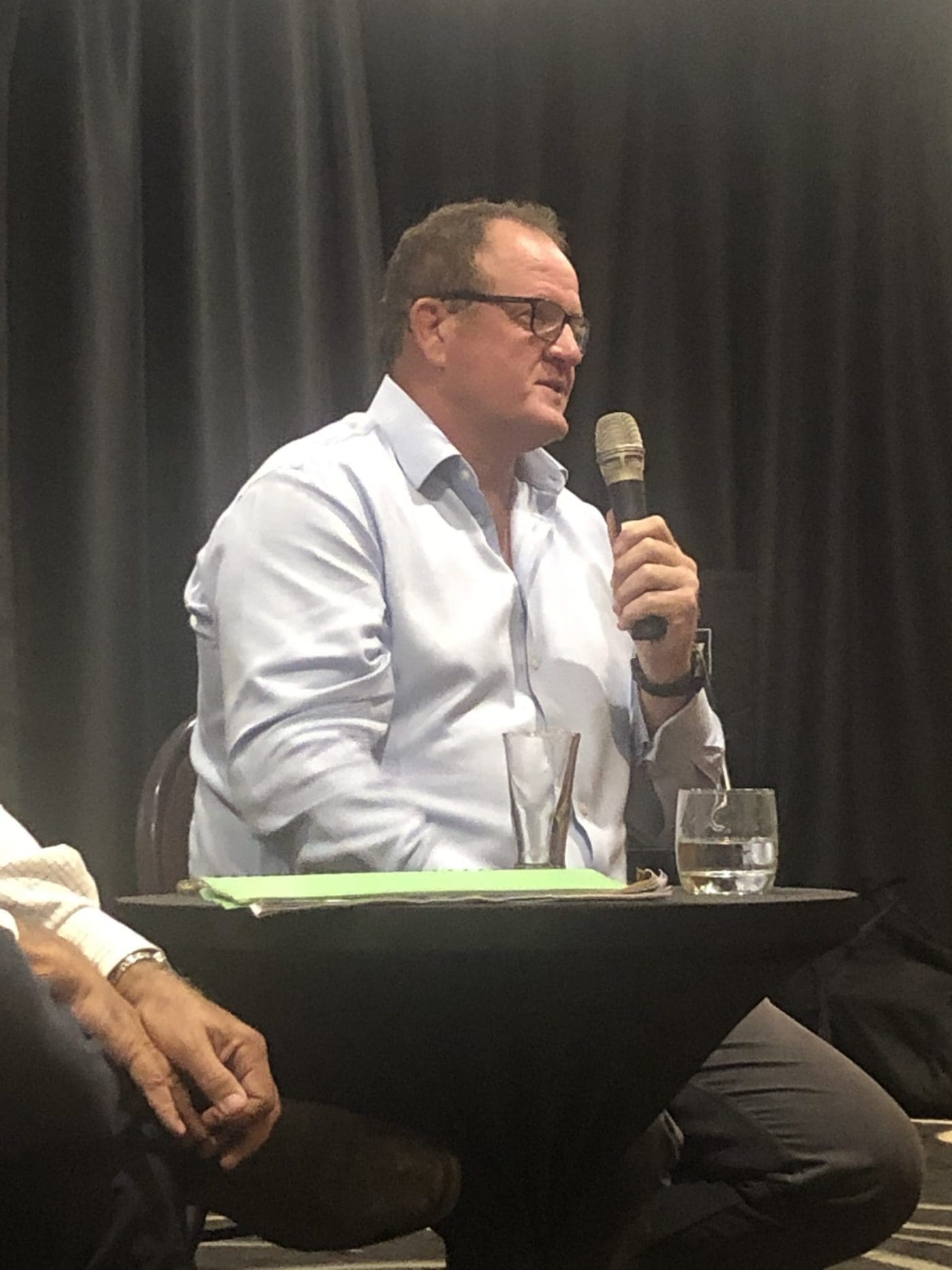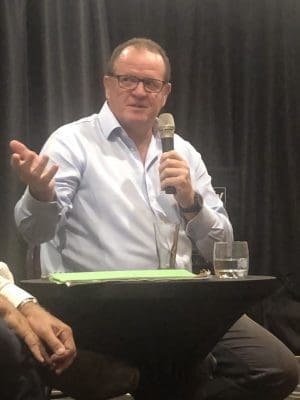
MC rural journalist Peter Lewis and Jock Whittle at the McCullough Robertson breakfast at Beef 2021 this morning.
THE rugged and individualist nature of some of Australia’s cattle producers could be part of the reason for declining beef production according to one agribusiness leader.
 Jock Whittle is the head of asset performance for MIRA Agriculture for the Macquarie Group and spent 12 years as chief executive officer of Paraway.
Jock Whittle is the head of asset performance for MIRA Agriculture for the Macquarie Group and spent 12 years as chief executive officer of Paraway.
He told delegates at the McCullough Robertson breakfast at Beef 2021 this morning that the trajectory of falling beef consumption was concerning, as were industry statistics that showed 55 per cent of Australian consumers consider beef producers to be trustworthy and ethical.
“That means that 45 per cent of consumers don’t, and that is a significant wedge of the addressable market,” Mr Whittle said.
He said another statistic showed 55 per cent of consumers thought beef should be part of a balanced healthy diet.
“That’s the snapshot – if people trust your product, they are more than happy to buy it and I think that is quite alarming for the beef industry if roughly half the population doesn’t trust the beef industry,” Mr Whittle said.
“Those numbers should be jumping off the page and everyone should be talking about them. but they are not.”
Mr Whittle said the current buoyant cattle market and confidence around the industry had led to a level of complacency.
“When we are sitting here with cattle prices the way they are today and there is so much confidence in the industry, it’s really easy to just ignore that and say not my problem,” he said.
“Consumer engagement is something that you work on for decades and years and the trajectory (of lower consumption) is concerning.

“I think we all love rugged individualism in the beef industry and it’s what is part of our culture, but it is a very fine line between there and isolationism, where you start with this attitude of you can’t tell me what to do, go away, you don’t understand what I do.”
Mr Whittle said beef demand could rise or fall in the future, but to not engage with consumers was not sensible.
Part of the beef industry’s challenge was its carbon footprint, and Mr Whittle drew on his experiences dealing with the top end of town and investors to show their heightened awareness alongside sustainability.
“I have a view on this from my lens talking to a lot of investors both in Australia and foreign investors who potentially could be investing in Australian agriculture,” he said.
“They have been interested in sustainability since 2007 – ever since I have been involved with Paraway.
“It has absolutely ramped up on investors’ list or priorities on how they make decisions and how they make choices.”
And while individual producers may think they are playing in a different ballgame to large corporates responding to investor demands, Mr Whittle disagrees.
 “A stand-alone beef producer who has their own cattle and therefore in charge of their own destiny and doesn’t have to go out and raise money can easily take the isolationist view,” he said.
“A stand-alone beef producer who has their own cattle and therefore in charge of their own destiny and doesn’t have to go out and raise money can easily take the isolationist view,” he said.
“They can say leave me out of this, it’s not my problem, the problem is somewhere else.
“I just think you just need to think about how that (attitude) is received by the 45 per cent of consumers that don’t trust us.
“They just see that as pushing it away, not taking accountability and not wanting to be a part of the society they want to be in and that is driving them away from our product.”
Engaging with the conversation could make a difference and Mr Whittle said it was often about the initial response from a producer that changed that conversation.
“It is interesting if you change the first sentence in your response that it then changes the whole journey from that point on,” he said.
“If you start the response with no, we should get an exemption, it’s not our problem, well then you’ve locked the gate.
“If your first response is, we acknowledge the issue, agriculture has to do its bit, as everyone else does, we can solve this problem together, we are engaged, we don’t have the answers today, but we are working as an industry to get there, then that reclaims the conversation.”
Mr Whittle said he did not feel the issues that the beef industry was facing in this field were going to go away.
He said the EU had already contemplating carbon-related tariffs for products going into this market.
“So, if you want to sell into the EU and have access into that market, you are going to have to have a different story than go way, it’s not our problem,” he said.
